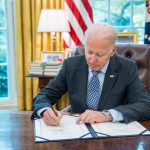In a stunning turn of events, Senate Minority Leader Mitch McConnell (R-KY) has announced that he will not seek another term as the top Republican in the Senate. This bombshell announcement has ignited fiery debates on whether the next leader should be subjected to term limits.
Senate GOP fractures over term limits for McConnell successor https://t.co/uWwV8bflzB
— David Sivak (@DISivak) March 8, 2024
The Republican conference has decided that every leadership position should be term-limited, except for the top dog. McConnell has been steering the ship for over 17 years, and this exemption has stirred up quite the commotion amongst the party faithful.
Senator John Cornyn (R-TX), who is in the running to take over McConnell’s position, has been the spark that ignited the term limits debate. He has made term limits a cornerstone of his campaign, hoping to appeal to the conservative base that has not been enamored with McConnell’s leadership style. However, McConnell quickly shut down Cornyn’s proposal, calling it “totally inappropriate” and defending his leadership record.
Senate Minority Whip John Thune (R-SD), also in the running for McConnell’s position, has remained tight-lipped on the term limits issue, stating that it’s premature to weigh in. This divide on term limits is shaping up to be a pivotal factor in the leadership election, which is still many months away.
Conservative firebrand Senator Ron Johnson (R-WI) has demanded a meeting to hash out the future of the conference, insisting that the members should first agree on a mission statement before electing a new leader. Johnson is also working on a list of rule changes that he hopes will gain support from his fellow party members.
While the process for amending the rules is separate from the leadership elections, conservatives are eager to see where the potential successors stand on issues like term limits. Senator Mike Lee (R-UT) has expressed his desire to hear from the leadership candidates about potential changes to the conference rules before throwing his support behind anyone.
Cornyn, who has aligned himself with McConnell, has tapped into the discontent among conservatives by championing term limits. However, there are Republicans who believe that term limits should not be a deciding factor in the leadership election, including Senator Marco Rubio (R-FL) and Senator James Lankford (R-OK).
On the flip side, there are staunch opponents of term limits, such as Senator Markwayne Mullin (R-OK), who is backing Thune in the leadership race. Mullin argues that the regular elections are sufficient to hold leaders accountable.
The issue of term limits has greatly influenced the race for the next Republican leader, as both Thune and Cornyn have reached their maximum six years in their current leadership roles. Even the possibility of Senator John Barrasso (R-WY) succeeding McConnell was dashed when he announced that he would pursue the whip position instead.
The upcoming conference meeting, scheduled for March 20 according to Johnson, will provide a platform for the members to debate whether term limits should apply to the leader. Barrasso emphasized that any proposed rule changes will be vigorously debated, as the Republican conference does not amend its rules frequently.
The stage is set for a fierce battle within the Republican Party as candidates position themselves on the issue of term limits and vie for the coveted leadership role. The outcome of this heated debate may reshape the future of the party and its leadership structure.




